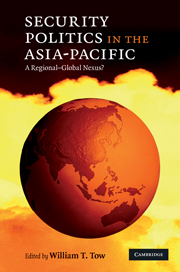Book contents
- Frontmatter
- Contents
- List of illustrations
- About the contributors
- Preface
- Acknowledgements
- List of abbreviations
- 1 Setting the context
- Part I
- 2 Grappling with an elusive concept
- 3 Asia-Pacific institutions
- 4 The United States: regional strategies and global commitments
- 5 A rising China and American perturbations
- Part II
- Part III
- Part IV
- References
- Index
5 - A rising China and American perturbations
Published online by Cambridge University Press: 05 June 2012
- Frontmatter
- Contents
- List of illustrations
- About the contributors
- Preface
- Acknowledgements
- List of abbreviations
- 1 Setting the context
- Part I
- 2 Grappling with an elusive concept
- 3 Asia-Pacific institutions
- 4 The United States: regional strategies and global commitments
- 5 A rising China and American perturbations
- Part II
- Part III
- Part IV
- References
- Index
Summary
The ‘regional–global nexus’ runs implicitly through the often dichotomous debates over China's (re-)emergence and its broader strategic implications. Not surprisingly given their privileging of the state as the primary unit of analysis in international politics (see, for example, Waltz 1979), the voices of scholars of the realist/neo-realist persuasion have been particularly prominent in these debates. Many realists, for instance, argue that China will inevitably seek to convert its burgeoning economic and military power into regional (and conceivably even global) hegemonic status. The most prominent amongst these is John Mearsheimer, who follows the logic that ‘the overriding goal of each state is to maximize its share of world power, which means gaining power at the expense of other states … [t]heir ultimate aim is to be the hegemon – that is, the only great power in the system’ (Mearsheimer 2001: 2). In the policy world, similar realist proclivities are evident in portrayals of China as a ‘strategic competitor’ whose growing regional influence in Asia needs to be ‘contained’, with a view to preserving the current US-led world order (see, for example, Rice 2000).
Many liberals, by contrast, see promise rather than peril in China's impressive economic growth. They see largely positive ramifications flowing from the fact that China is becoming increasingly enmeshed economically and engaged institutionally at both the regional and global levels.
- Type
- Chapter
- Information
- Security Politics in the Asia-PacificA Regional-Global Nexus?, pp. 85 - 98Publisher: Cambridge University PressPrint publication year: 2009

